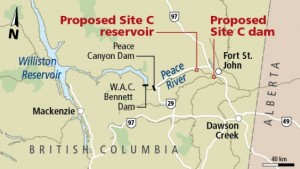
Photo Published: January 28, 2013
With the majority of British Columbia being First Nation land, it is nearly impossible for major corporations in the region to expand and progress without encountering legal issues regarding new projects on First Nation land. First Nations are most concerned over the effect of these developments will have on their traditional lifestyles. Companies who are wishing to expand must seriously take into consideration the legal issues they will face when developing new technologies on Native land while keeping in mind the effects these developments may have on the environment. Rather than pushing their way onto the land, they should make deals with the First Nations and incorporate them into the decision-making process while also compensating them for the use of their land.
BC Hydro is attempting to get the approval to construct and operate a dam and 1100 megawatt hydroelectric generating station on the Peace Rive in northeastern British Columbia. This megaproject could lead to flooding resulting in the destruction of farmland and wildlife habitat that are crucial to the First Nations inhabiting this land and their traditional practices of fishing.
Although I believe it to be important that companies maintain good relations with First Nations, they must also continue their expansions as population grows, technology develops and demand increases. If the benefits of the project outweigh the negatives then the company should be granted permission to begin this project despite the imposition on Native land. BC Hydro should try to make a deal with the First Nations. BC Hydro should develop technology that can reduce the cause of flooding and in the case of a flood be responsible for the damage and clean up. The company should incorporate First Nations in their decision making process in order to reduce environmental degradation and avoid legal issues. The First Nations should also receive compensation for their land.